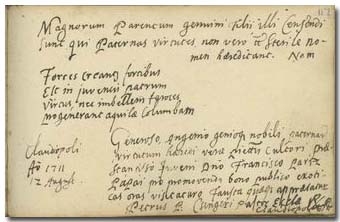
Magnorum parentum gemini Filii illi censendi
sunt qui paternas virtutes, non verò et sterile nomen haereditant.
Nam
Fortes creantur fortibus
Est in juvencis patrum
Virtus, nec imbellem feroces
Progenerant aquilae columbam. *
Generoso, ingenio genioque nobili paternarum
virtutum haeredi verae pietatum cultori praestantissimo juveni
D[omi]no Francisco Pariz Pápai pro promovendo bono publico
exoticas oras visitaturo Fausta quaeque appraecatur
Petrus P. Csengeri Pastor Eccl[esi]ae
Ref[ormatae] Claudiopoli[tanae]
Claudiopoli A[nn]o 1711 12 August.
|
* The source of this poem is Horace,
Carmina 4.4.29-32, but the first two verses are
inaccurately (albeit grammatically correctly) quoted. Csengeri
obviously tried to put into the Procrustes' bed of the shorter
metre of the third and fourth verse the first two longer ones.
The original poem sounds like this (ed. F. Klingner 1955):
fortes creantur fortibus et bonis;
est in iuvencis, est in equis patrum
virtus, neque inbellem feroces
progenerant aquilae columbam. In the
English translation by John Conington: Good sons
and brave good sires approve:
Strong bullocks, fiery colts, attest
Their fathers' worth, nor weakling dove
Is hatch'd in savage eagle's nest. |
|
|
Those are to be regarded worthy sons of their great parents who
have inherited the virtues, and not only the sterile name of their
fathers. For
Strong [sons] are generated by strong [fathers]
/ young bullocks inherit their father's / virtue, and wild eagles
/ will not hatch weakling doves. *
I wish all the best to the excellent young
Ferenc Pápai Páriz, noble heir of his father's virtues both in his
talent and his intellect, zealous supporter of true piety, who is
going to set out to visit foreign countries in the interest of
common good
Péter Csengeri, Pastor of the Reformed Church in
Kolozsvár
In Kolozsvár, August 12, 1711.
|
p.
117. Kolozsvár/Cluj, August 12, 1711
Csengeri, Péter
(?-1720), Transylvanian Reformed
pastor
Péter (P.) Csengeri
learned in Franeker and Utrecht. He immatriculated in Franeker on
August 25 (28?), 1696 as “K. P. Czengeri from Nagyvárad [Oradea]”.
A letter of him, written to his patron Judit Veér, widow of Mihály
Teleki, has survived. After returning home, from the beginning of
1711 he was pastor in Kolozsvár. He died in 1720.
Péter Csengeri made his note in the Album in
Kolozsvár in August 1711, before the young Ferenc Pápai Páriz set
out on his long peregrination.
• Graaf
• Nagy Géza 41 • Szilágyi 40 |